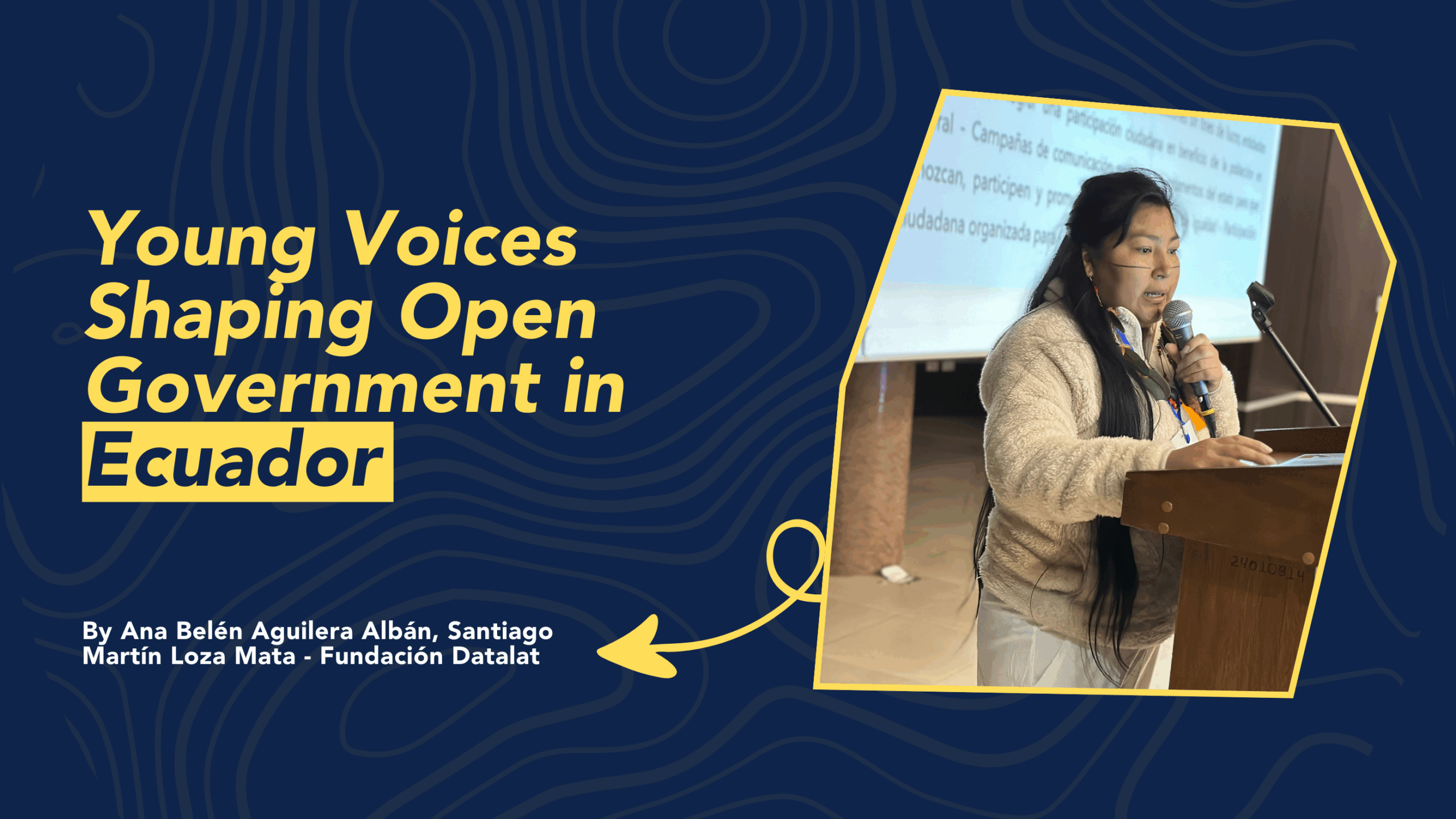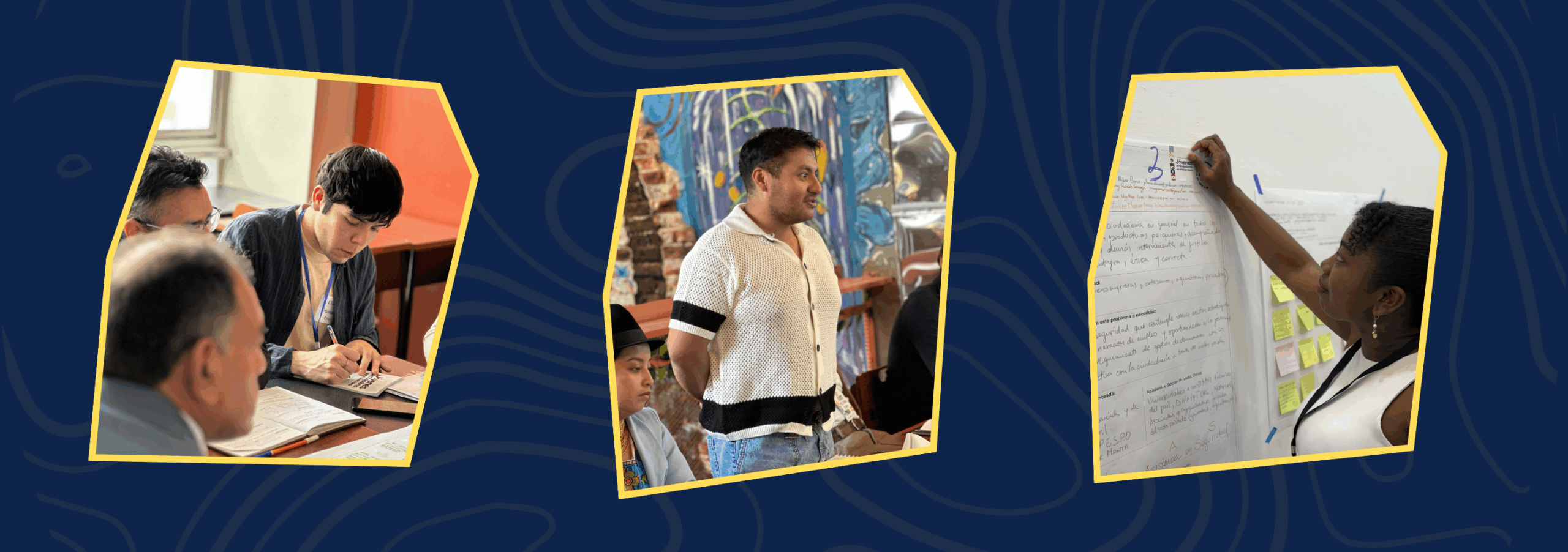
By Ana Belén Aguilera Albán, Santiago Martín Loza Mata – Fundación Datalat
In Ecuador, citizen trust in political institutions is in a sharper decline than the regional average, representing a central challenge for strengthening democracy and youth participation.
Young people face significant barriers to their development and to their social, civic, and political participation. By 2025 the rate of adequate employment among young people stands below 35%, making them one of the groups at greatest risk of precarious work. Only four out of ten young people are enrolled in a higher education institution. Income poverty reached 24%, almost doubling down in rural areas to 41.7%.
In this context, the question is urgent: How can young people, especially those mostly affected by inequality, take part in shaping national decisions and building a more open and democratic future?
To help answer this, Fundacion Datalat launched the Youth Ambassadors for Open Government project in July 2025. Through this initiative, we aimed to bring in new voices to the co-creation process of Ecuador’s Third National Action Plan under the Open Government Partnership (OGP), which is taking place amid shifting priorities in international cooperation funding, high levels of insecurity, and structural changes in the Ecuadorian public sector.

We brought together a group of twenty-nine representatives from fifteen provinces, to be trained and supported to engage in citizen–government dialogues, intergenerational discussions, and digital advocacy. The goal was to foster active, informed, and meaningful participation from young leaders, most of them representing civil society organisations, who had not previously been involved in processes such as the national OGP dialogues.
The ambassadors took leadership roles during collaborative roundtables and succeeded in highlighting the issues that truly affect them. Most importantly, they demonstrated that far from being a quota, their participation shifted the tone of the conversations.
“Beyond the initial fear of not being heard, […] as I shared my ideas, I noticed how some actors began to show interest in my perspectives. At the end, one actor who initially did not understand my ideas came up to me and said, surprised and curious, that he had never participated in a space where young people were included, and that he thought it was something new, necessary, and valuable.”
– Mariela Paredes, Youth Ambassador for Open Government
We also tackled territorial exclusion by involving youth from rural areas, indigenous communities, and cities that were not considered as venues for the dialogues. For many of them, this was their first opportunity to connect their local realities with national debates, and to speak with government representatives and social actors. In some cases, they developed concrete proposals for national problems; in others, they pushed the conversation toward creating better conditions for youth development as a path to a more sustainable future.
The purpose of establishing a Youth Ambassadors initiative, beyond promoting their participation in citizen-government discussions to raise awareness of the urgent need to work together, was to encourage them to act as multipliers back in their own communities and organisations. And that’s exactly what happened.
Michael Jungal and Mayra Taant mobilised peers online, urging them to participate in the process. Ronny Angulo worked with other Youth Ambassadors to take the conversation offline, leading a workshop where members of his local community drafted proposals on paper before uploading them online. In total, twelve Youth Ambassadors organised workshops in their communities, and together they launched twenty-nine communication actions across social media, multiplying the reach of the initiative and inspiring even more young people to join.
These efforts showcased that if citizens, especially youth, are more aware of the means to be part of public decision making, they will find a way to participate and take action in their communities.
Finally, the process highlighted an important challenge: the need to facilitate continuous collaboration between youth and the government. Even though the Ambassadors are not able to directly influence the content in the National Action Plan, this was a solid first step toward ensuring youth voices are part of the debate. The groundwork has been laid, but now comes the harder task, building mechanisms that make youth contributions visible, taken seriously, and integrated into decision-making.
Change is gradual. It requires persistence. Youth participation is not a one-off event, but a process of building bridges, learning to navigate institutional challenges, and showing that their contributions strengthen democracy for all. The Youth Ambassadors showed that this path is possible, but they also remind us that it is just the beginning.
That’s why our call is two-fold. Public authorities must open more spaces where young people can meaningfully contribute and see their proposals translated into action. Young people, on the other hand, must continue to raise their voices to claim their place in shaping the future, no matter how difficult it may be to observe progress.
“Do not underestimate your voice or your ability to influence. […] I invite more young people to get organised, to join monitoring initiatives, to propose local ordinances or community projects, and to demand transparency at every level.«
– Jefferson Castillo, Youth Ambassador for Open Government